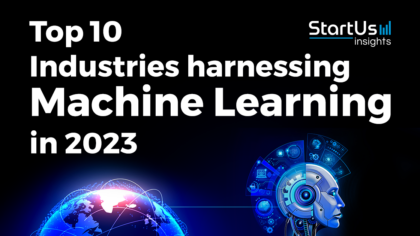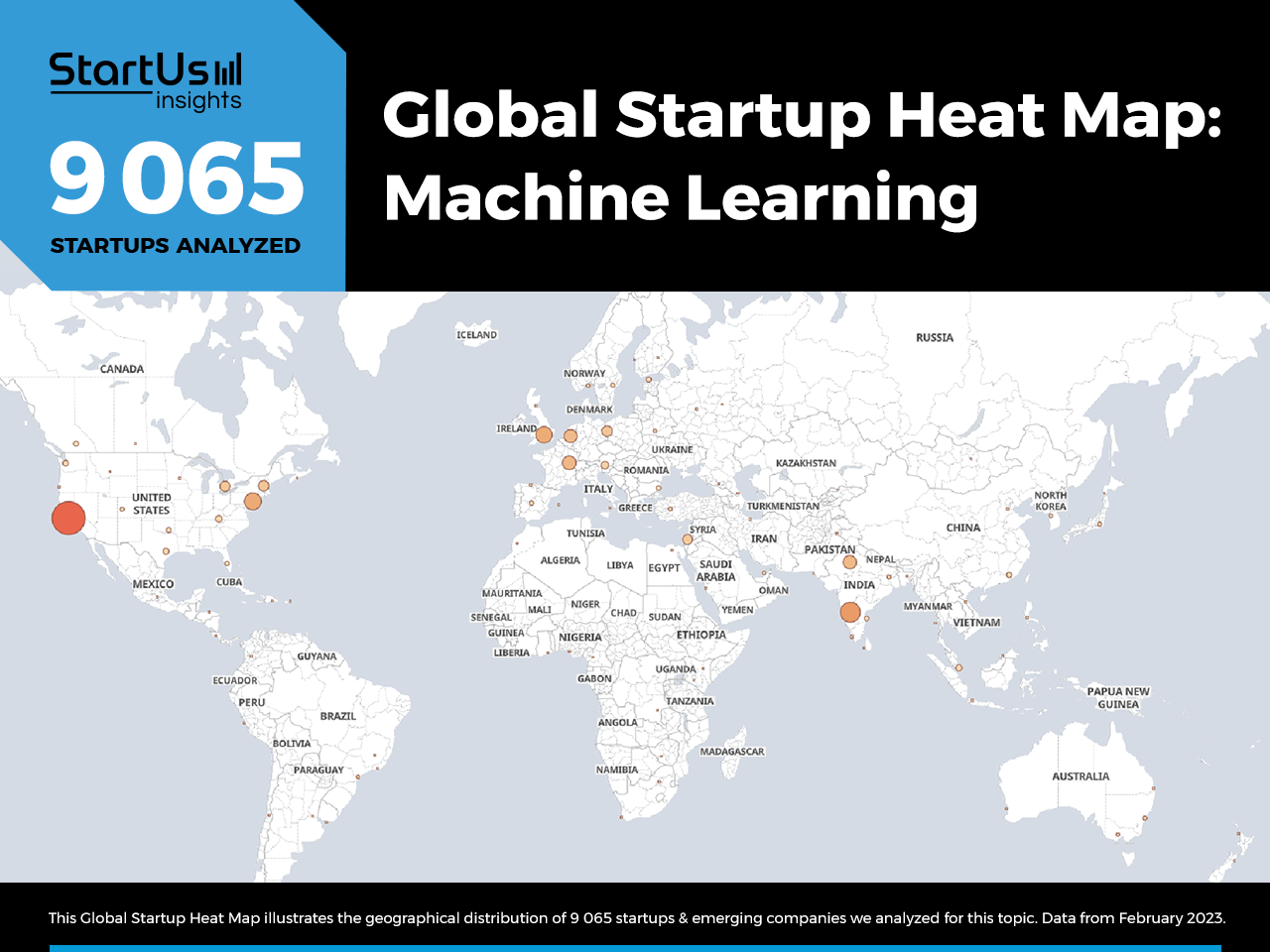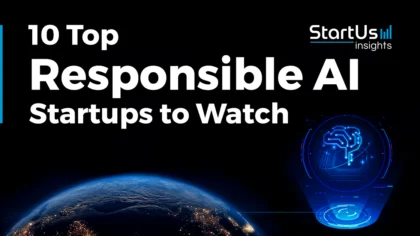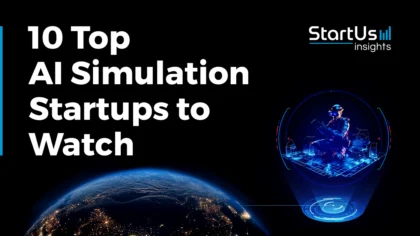Digitization of legacy systems generates massive amounts of critical information. Machine learning analyzes this data to reveal hidden patterns and trends. We give you data-driven innovation insights based on our analysis of 9 065 machine learning startups & technologies so that you do not miss out on emerging solutions that advance data processing. They allow you to automate operations and generate valuable business insights. Read more to explore the impact of machine learning on 10 industries and how they advance your business.
Tree Map reveals the Impact of Machine Learning on 10 Industries
Based on the Innovation Map, the Tree Map below illustrates the impact of Machine Learning on 10 industries in 2023. The manufacturing and automotive sectors utilize machine learning to facilitate asset monitoring and quality control, improving plant efficiency. On the other hand, healthcare organizations leverage it to monitor patients and enhance medical image analysis. Financial and retail companies use machine learning to personalize product offerings and mitigate fraud. Further, logistics and mobility companies optimize routes and asset utilization using machine learning. ML-driven workflows accelerate drug development in the biotech industry while educational institutions utilize them to make learning interactive and personalized.
Global Startup Heat Map covers 9 065 Machine Learning Startups & Scaleups
The Global Startup Heat Map below highlights the global distribution of the 9 065 exemplary startups & scaleups that we analyzed for this research. Created through the StartUs Insights Discovery Platform that covers 2 500 000+ startups & scaleups globally, the Heat Map reveals that the US has a high concentration of machine learning startups, followed by India.
Below, you get to meet 10 out of these 9 065 promising startups & scaleups as well as the solutions they develop. These 20 startups are hand-picked based on criteria such as founding year, location, funding raised, and more. Depending on your specific needs, your top picks might look entirely different.
Impact of Machine Learning on 10 Industries in 2023
1. Manufacturing
Factories create massive amounts of data with industrial control systems (ICSs), the internet of things (IoT), and more. To better utilize this data, manufacturers leverage machine learning. It enables predictive maintenance of factory assets, automated quality control, and optimal warehouse management. Further, startups offer machine learning-based solutions to aid product development. They allow manufacturers and engineers to align product design with customer demands, enable generative design, and mitigate costly engineering flaws. Consequently, machine learning improves overall efficiency and reduces the operational costs of manufacturing plants.
Secondmind aids Automobile Engineering
UK-based startup Secondmind leverages machine learning to engineer and design cleaner cars. The startup’s platform offers advanced digital modeling features for automobile manufacturers to create data-driven car designs. It also features experimenting and simulating modules to test the performance of model designs and identify vehicle parameters such as emissions levels. As a result, Secondmind enables automobile manufacturers to reduce complexities associated with electric vehicle (EV) development.
2. Healthcare
Healthcare organizations primarily use machine learning in medical imaging. ML-powered analysis tools quickly and precisely analyze medical images such as X-ray and computed tomography (CT) scan images. This provides granular insights into organs or patient conditions and accelerates disease diagnosis and treatment. Additionally, machine learning solutions tailored for healthcare applications advance drug development, surgical planning, personalized medicine, patient monitoring, and more. Thus, ML-based tools serve as clinical decision support systems across healthcare operations and improve care delivery.
Medipixel facilitates Coronary Artery Analysis
South Korean startup Medipixel offers a machine learning-based solution for coronary artery analysis. The startup’s solution, Medipixel XA, combines computer vision, deep learning, and reinforcement learning to analyze coronary angiograms. It provides automated angiogram classification, lesion analysis, vessel segmentation, and stent recommendation. This mitigates the need for error-prone manual segmentation and reduces treatment times, radiation exposure, and treatment costs.
3. Logistics
Logistics operations involve an overwhelming number of stakeholders and deal with limited visibility into operations, leading to bottlenecks. Machine learning solutions integrate with logistics and supply chain management systems to enable real-time data analysis. This allows companies to promptly identify inefficiencies, enable real-time process tracking, and improve revenue. Moreover, ML powers demand forecasting, inventory optimization, logistics route optimization, and supplier analysis, among others. These applications enable data-driven supply chain planning and enhance the reliability of global supply chains.
Pandion aids Delivery Optimization
US-based startup Pandion facilitates delivery optimization. It utilizes machine learning for faster, more precise, and more reliable integration with the delivery network for last-mile deliveries. This results in better on-time delivery and allows for improved asset utilization. Additionally, the startup’s solution improves shipper performance while building customer relations at lower costs.
4. Financial Technology
Open banking and IoT provide financial companies with highly relevant data that aid product development, risk management, and more. Therefore, FinTechs leverage machine learning to analyze this data. For instance, machine models trained with data associated with financial interactions, loan repayments, and customer interactions allow businesses to forecast upcoming trends and market risks. Machine learning also enables robotic process automation (RPA), algorithmic trading, and automated underwriting for finance and insurance companies. Lastly, ML-based tools allow them to personalize product offerings and prevent fraud by leveraging customer behavior analytics.
AiDA offers Finance Analytics
AiDA is a Singaporean startup that provides a product suite for financial analytics and process automation. The startup’s ML-based solutions allow banks and insurance companies to develop novel products for fraud detection, underwriting automation, and agent performance management. These solutions provide insights into banking processes and, in turn, identify productivity bottlenecks, accelerate processes, reduce costs, and manage risks. Besides, AiDA’s on-premise product suite mitigates cybersecurity risks and eliminates data silos.
5. Mobility
Advances in connected vehicles and in-vehicle apps offer real-time mobility data. Using this data, startups develop machine learning solutions that improve visibility into road traffic and enhance service matching. They, in turn, improve road safety and passenger experience. Mobility providers also leverage machine learning to optimize travel routes and offer personalized offers and rides for customers. As a result, they are able to maximize mobility asset utilization and increase revenue.
Avenieuw develops a Traffic Management Platform
Dutch startup Avenieuw provides a traffic management platform for end-to-end mobility solutions. It collects data from various sources and uses it to analyze, predict, recommend, and continuously learn about traffic information. The platform integrates with other traffic-based apps and features parking capacity identification. It also assists the parking for various mobility options such as cars, public transport, and cycles.
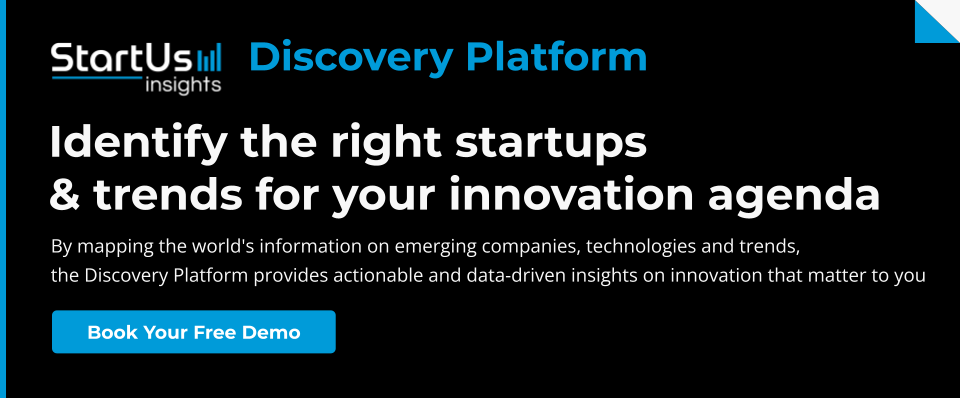
6. Retail
Customers generate a massive amount of digital touchpoints through retail stores. Consequently, startups utilize this data to power machine-learning solutions for retail companies. They aid in forecasting market demands, optimizing pricing strategies, personalizing marketing efforts, and more. Further, ML enables customer behavior analytics for eCommerce and retail stores. This allows businesses to offer products that match better with customer preferences, increasing revenue and repeat sales. Machine learning also improves retail warehousing efficiency by automating inventory tracking and prediction.
Circly enables Operations Optimization
Austrian startup Circly provides AI-powered planning tools for the retail sector. The startup’s solution uses machine learning to automate routine tasks from forecasting to planning. It recognizes purchase influencing factors and forecasts customer purchase behavior. This allows retailers to improve sales planning accuracy and dynamically change forecasts based on the influencing factors. Consequently, Circly increases delivery efficiency and inventory reliability.
7. Automotive
The automotive industry uses machine learning in production units and in-car applications. For example, machine learning automates processes like quality monitoring and inventory tracking in factories while it powers autonomous systems in vehicles. ML-powered advanced driver assistance systems (ADAS) also allow vehicle manufacturers to improve vehicle safety and mitigate accidents. Machine learning enables predictive maintenance of vehicles and manufacturing assets. Lastly, automakers leverage it to attract quality leads and enhance customer experience.
Spark aids EV Optimization
UK-based startup Spark develops an ML-based product that estimates the range of miles an EV can travel after a full charge. It collects data about various parameters such as terrain and recent driving behaviors for human-driven and autonomous vehicles to estimate the vehicle range. This reduces range anxiety among EV drivers and owners.
8. Biotechnology
Machine learning in biotechnology greatly affects omics technologies, genomics, transcriptomics, proteomics, and metabolomics. In agricultural biotechnology, machine learning allows researchers to quickly identify target molecules. Similarly, ML models accelerate drug discovery and enable decision support systems (DSS) for drug pipelines. Machine learning enables biotech companies to leverage real-world data (RWD) and enable precision medicine. Among others, machine learning improves genetic simulations, optimizes bioprocesses, and enhances bioimage analysis.
Anagenex engineers DNA Encoded Libraries (DEL)
US-based startup Anagenex develops DNA-encoded libraries. By combining ML with proprietary DELs, the startup’s solution analyzes more compounds and generates useful data to identify better compounds faster. Anagenex builds compound libraries and deploys custom selection methods. Analyzing the resulting data with ML and computational chemistry, the solution generates insights to design follow-up experiments. This accelerates molecule development for medically important targets.
9. AgriTech
Farmers use machine learning to analyze massive amounts of field data to improve yield and optimize operations. Moreover, ML-powered solutions enable precision agriculture by providing high-resolution insights into field characteristics. For example, analyzing soil color and environmental data allows farmers to forecast yields. ML also powers autonomous systems in tractors, robots, and drones. Further, machine learning-based surveillance systems enable farm managers to monitor fields and identify breaches. In livestock management, machine learning aids animal monitoring to improve animal health, increase profits, and reduce the carbon footprint.
Aquabyte provides a Cloud-based Aquaculture Platform
Norwegian startup Aquabyte applies machine learning and computer vision to improve the efficiency of fish farming. The startup’s product combines a camera, a cloud-based ML system for image analysis, and a web-based decision-making framework to perform automatic lice counting and fish weighing. Aquabyte’s product thus provides large-scale aqua farm managers and operators to track feed performance and receive early warnings of disease indicators.
10. Education Technology
EdTech startups use machine learning to better understand learners and personalize their learning experiences. Through this, trainers and educators are able to ensure learner satisfaction and improve performance. In school and college administration, machine learning solutions automate backend operations like curriculum management, student progress tracking, and more. With these solutions, ML minimizes administrative burdens, aids interactive learning, enables virtual tutors, and reduces dropouts.
Astrid Education provides a Voice-based Language Tutor
Astrid Education is a Swedish startup that makes a voice-based language tutor. It utilizes machine learning to personalize learning and actively listen, evaluate, and support pronunciation and fluency practice in real-time. Additionally, the solution provides insights into individual student progress and offers tailored learning recommendations.
Discover All Machine Learning Startups
Deep learning and neural networks will improve the performance of data processing workflows. This accelerates the adoption of data processing technologies across industries. Consequently, machine learning will boost operational efficiency and enable data-driven decision-making. Innovations in high-performance computing (HPC), edge IoT, and artificial intelligence of things (AIoT) further move processing closer to the data source. Get in touch to identify specific machine learning startups & solutions that advance your business!
